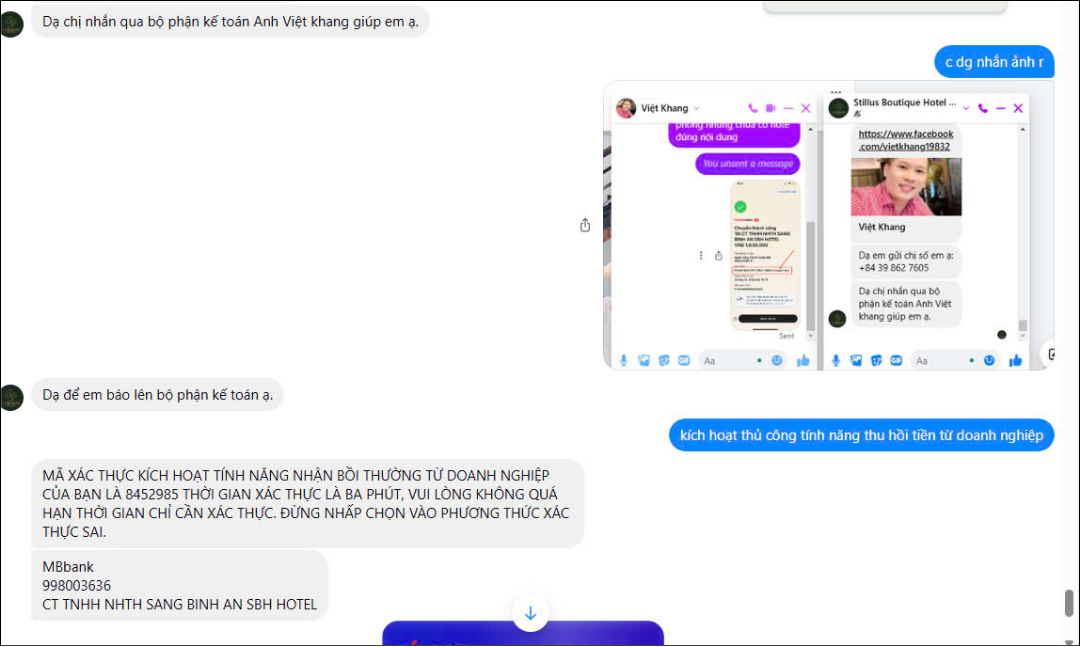In today's fiercely competitive hospitality landscape, hoteliers are constantly searching for ways...
Online Traps: Exposing Hotel Booking Scams With Hotel Link
Hotel booking scams have become a growing issue in Vietnam, causing significant financial losses for travelers and negatively impacting the country’s tourism reputation. The rise of digital technology, especially the increasing popularity of online booking, has unfortunately created opportunities for scammers to take advantage of unsuspecting customers. Join Hotel Link as we delve deeper into this issue, uncover common scam tactics, and equip yourself with the knowledge needed to avoid online traps and protect yourself.
Sophisticated Scamming Tactics
To deceive travelers, scammers use sophisticated and constantly evolving tactics to approach victims. They often target well-known and high-demand hotels or resorts to build trust. Using advanced tools, they create fake websites or fan pages that look nearly identical to the real ones, featuring high-quality images, positive reviews, and fake hotline numbers to mislead travelers. These fake pages frequently update their posts immediately after the official pages, mimicking interactions to appear legitimate.
Here are some common hotel booking scams that have been reported recently:
-
Fake Websites/Fan Pages: Scammers create counterfeit websites and social media pages that closely resemble reputable hotels and resorts. They use high-quality images, fake positive reviews, and fraudulent hotline numbers to deceive customers. Some even go so far as to obtain Facebook’s blue verification tick to appear more credible.
-
False Information: Scammers provide exaggerated descriptions and misleading images. Some even adopt names similar to well-known brands to trick customers. Upon arrival, guests realize the hotel does not match the advertised descriptions.
-
Price Manipulation: Scammers advertise significantly lower room rates than market prices to attract travelers, leading them to make bookings and transfer money.
-
Repeated Transfer Requests: After the initial deposit, scammers claim there was an error in the payment details and ask for another transfer to "correct" the mistake. This tactic is repeated multiple times, gradually increasing the requested amount until the traveler realizes they’ve been scammed.
Recent Hotel Booking Scam Cases
To highlight the severity of these scams, here are some notable cases that have recently occurred in Vietnam:
-
A 1-Billion VND Scam Case: A female traveler from Hai Phong lost over 1 billion VND when booking a stay at Minawa Kênh Gà Resort (Ninh Bình) through a fake Facebook fan page. The scammers repeatedly asked her to transfer deposits, increasing the amount from 39.5 million VND to 485.6 million VND. She only realized she had been scammed when she could no longer contact the resort.
-
Other Reported Cases: Many travelers in Vietnam have reported losing amounts ranging from 1 to 5 million VND. A quick search on social media for “hotel booking scam” reveals numerous posts from victims warning about this growing issue.
Unmasking Hotel Booking Scams in Vietnam
Fake Fan Pages – The Perfect Disguise
Leveraging the popularity of social media, particularly Facebook, scammers create fake fan pages for hotels and resorts with nearly identical branding. They replicate the original page’s design, images, and information, even obtaining verification badges to appear legitimate.
However, keen-eyed travelers can spot red flags:
- Incorrect Contact Information: Hotline numbers may not match the hotel's actual region, fake websites may be inactive, reviews may be outdated, or fan page URLs may contain unusual characters.
- Spelling Mistakes: Messages from scammers often contain basic grammatical or spelling errors.
- Fake Warnings: Some scammers go so far as to post warnings about hotel booking fraud to divert suspicion from their own fake pages.
- Suspicious Page Information: Posts may have altered timestamps, and the "Page Transparency" section may show frequent name changes or admins from unrelated locations.
The "high-handed" trick of pickpocketing tourists
Many tourists who were scammed shared that they transferred money many times to fake parties, some even lost nearly billions of dong as in the case of Ms. H. (Hai An district, Hai Phong - character name has changed) when searching and booking a room for the whole family's spring trip through the green area fanpage named Minawa Kenh Ga Resort & Spa Ninh Binh. This raises a big question: How can scammers get money from tourists so many times? Surely this trick is not simply quoting the room price and then tricking them into transferring money only once. Let's join Hotel Link to uncover the secret, exposing the sophisticated tricks that scammers use to steal huge amounts of money from gullible tourists.
Step 1:
When visitors ask to book a room, the fake fanpage will respond quickly, quote the price, time, and number of people professionally. Then, they will create pressure by announcing that the room is almost full and request a deposit or 100% payment.



If the guest agrees to book, they will provide a bank account number with the full company name and request a specific transfer. For example, they may ask the traveler to enter the transfer message as "AIT87" - a confusing string of characters because the uppercase "I" looks like a lowercase "l". This way, no matter how careful the guest is in booking, they can still report a transfer as incorrect.

Step 2:
After the first transfer, they will notify that "the system has not recorded" and ask the tourist to take a screenshot of the transaction. When the tourist provides the screenshot, they will "pretend to panic" and report that the customer typed the wrong content, request a second transfer to "hold the room" and promise to refund the first time.

- If the booking guest seems suspicious and requests an immediate refund, they will continue the "act" by bringing in an "accountant" (also fake) to guide you through the unreasonable refund process.

Step 3:
-
This "accountant" will ask you to type the command "Request a refund for booking" into the chat box with the fake fanpage to receive an OTP code to request a refund. This OTP code is usually in the format of 6 digits or more, for example: 766895 - 7465873 - 876574837. If read in currency format, it will be 766,895 VND - 7,465,873 VND - 876,574,837 VND.

- Then, they will ask you to enter this code in the "Amount to transfer" section on the banking app and enter the content "Refund for the above code booking request".
- In the final step, they will ask you to click "Agree to send", enter the OTP to transfer money from the bank and continue to hold your finger when clicking "Send" to display a "pop-up" message asking if you want to refund this transaction - a feature that does not exist on any banking app. The purpose of these operations is to make you lose your guard and transfer money a second time.
Ultimately, whether the guest followed the instructions or not, the result is still fraud and communication is blocked. Even if the guest receives a booking confirmation, when they arrive at the real hotel, there will be no information about the guest's reservation.
As hotel booking scams become increasingly sophisticated, their impact on both travelers and the hospitality industry is severe. What are the broader consequences for hotels and tourism? How can we effectively prevent and combat these scams? Stay tuned for the next article in this series by Hotel Link, or comment below if you'd like us to send you the latest updates directly!



